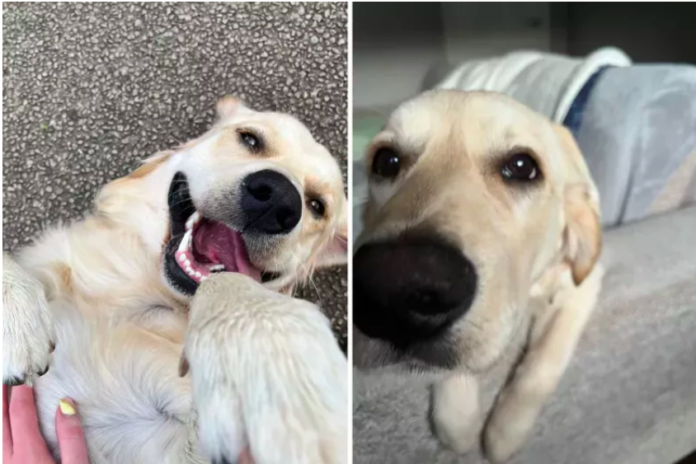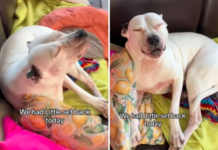Last Updated on July 11, 2024 by Fumipets
Golden Retriever’s Dramatic Behavior After Full Day with Owner Captivates Internet
The internet has fallen in love with a Golden Retriever who displayed an amusingly dramatic reaction after spending a full day with its owner. This endearing behavior has not only entertained viewers but also highlighted the unique personalities and emotional depth of our canine companions. In this article, we will explore the specifics of this delightful incident, delve into the reasons behind such dramatic canine behaviors, and provide tips on how to understand and manage them.
The Incident: A Day of Drama
A Golden Retriever recently gained internet fame after a video of its over-the-top reaction to a full day with its owner went viral. The dog, clearly overwhelmed with excitement and attention, put on a performance that left viewers both amused and enchanted. This dramatic display is a testament to the deep bond between pets and their owners and the lengths to which dogs will go to express their emotions.
Understanding Canine Behavior
Why Do Dogs Act Dramatically?
Dogs, like humans, have unique personalities and ways of expressing themselves. Dramatic behaviors in dogs can be attributed to several factors:
- Attention-Seeking: Dogs are social animals that thrive on interaction. They quickly learn that certain behaviors, especially dramatic ones, can capture their owner’s attention.
- Emotional Expression: Dogs feel a wide range of emotions, including joy, excitement, frustration, and anxiety. Dramatic actions are often their way of expressing these feelings.
- Learned Behavior: If a dog receives positive reinforcement for dramatic behavior (e.g., treats, affection, or playtime), they are likely to repeat it.
Interpreting the Signs
Understanding what your dog’s dramatic behavior means requires careful observation and consideration of the context. Here are some common dramatic behaviors and their possible interpretations:
- Whining or Barking: This can indicate a need for attention, food, or a desire to go outside.
- Rolling Over Dramatically: Often a sign of submission, playfulness, or a request for belly rubs.
- Exaggerated Movements: Such as jumping, spinning, or pawing, which usually signify excitement or a high energy level.
Managing Dramatic Behavior
While dramatic behaviors can be endearing, they can also become problematic if they disrupt daily life. Here are some tips for managing and moderating your dog’s dramatic tendencies:
Positive Reinforcement
Reward calm and appropriate behaviors with treats, praise, and affection. This encourages your dog to behave in a more controlled manner.
Consistent Training
Regular training sessions help establish boundaries and reinforce acceptable behaviors. Commands such as “sit,” “stay,” and “quiet” can be particularly useful.
Providing Mental and Physical Stimulation
Ensuring your dog gets enough exercise and mental stimulation can reduce dramatic behaviors born out of boredom or excess energy. Engage in activities like fetch, puzzle toys, and interactive games.
Understanding and Addressing Underlying Causes
Sometimes, dramatic behavior can be a sign of underlying issues such as anxiety, fear, or health problems. Consult with a veterinarian or a professional dog trainer if you notice excessive or concerning behaviors.
The Role of Social Media in Highlighting Pet Behavior
The internet and social media platforms have become powerful tools for sharing and highlighting pet behaviors. Viral videos of dogs like the Golden Retriever mentioned earlier provide entertainment, but they also educate viewers about the emotional complexities of dogs. These videos foster a greater understanding and appreciation of the bond between humans and their furry friends.
Final Thoughts
The Golden Retriever’s dramatic reaction after a day with its owner is a heartwarming reminder of the deep emotional connections we share with our pets. Understanding and appreciating these behaviors enriches our relationships with them, ensuring they lead happy and fulfilling lives.
Frequently Asked Questions (FAQs
1. Why do dogs exhibit dramatic behavior?
Dogs exhibit dramatic behavior primarily for attention, to express emotions, or because they have learned that certain actions elicit positive responses from their owners.
2. How can I manage my dog’s dramatic behavior?
Managing dramatic behavior involves consistent training, positive reinforcement for calm actions, providing adequate exercise and mental stimulation, and addressing any underlying issues that may be causing the behavior.
3. Is dramatic behavior in dogs a sign of a problem?
Not necessarily. While dramatic behavior can be normal and endearing, excessive or unusual behaviors may indicate anxiety, fear, or health problems. Consulting with a veterinarian or dog trainer can help identify and address any concerns.
4. What should I do if my dog’s dramatic behavior becomes disruptive?
If your dog’s behavior becomes disruptive, focus on consistent training, set clear boundaries, and ensure they get enough physical and mental stimulation. Seeking advice from a professional dog trainer can also be beneficial.
5. How can I better understand my dog’s behavior?
Observing your dog’s body language, paying attention to the context of their actions, and educating yourself about canine behavior through reputable sources can help you better understand your dog’s needs and emotions.
For more information, you can read the original article on Newsweek here.


















